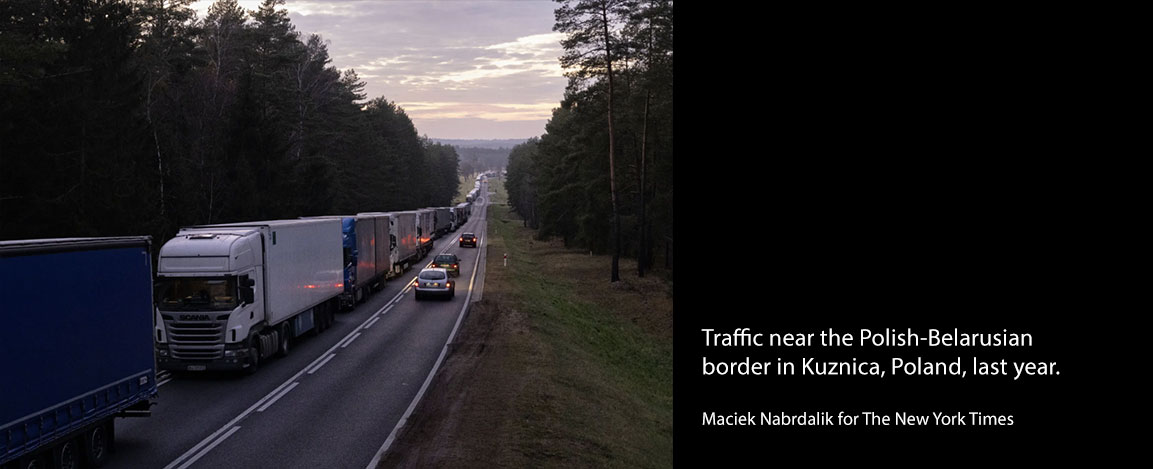The protest inspired similar actions at other border crossings over the weekend, and another in front of the office of Poland’s prime minister in Warsaw, calling on the authorities to completely close the Polish border to Russian and Belarusian trucks, writes Ada Petriczko, the 2021 Elizabeth Neuffer Fellow at CIS, who is currently reporting for the New York Times. This article first appeared here.
Protesters have blocked a border crossing between Poland and Belarus for several days, in an attempt to stop cargo trucks that some say are headed for Ukraine via Belarus with supplies for the Russian army.
Many of the protesters in Koroszczyn, Poland, have wrapped themselves in Ukrainian national flags. Both Polish and Ukrainian, the demonstrators have tried to prevent trucks with Russian and Belarusian license plates from leaving Poland.
European Union sanctions against Russia and Belarus do not apply to road transit of food and medications. That means cargo continues moving overland between the E.U. and Russia and Belarus. Hundreds of private trucks with Russian and Belarusian plates cross the border each day, with the line stretching for almost 10 miles on Saturday, according to the local police.
The protest inspired similar actions at other border crossings over the weekend, and another in front of the office of Poland’s prime minister in Warsaw, calling on the authorities to completely close the Polish border to Russian and Belarusian trucks.
According to TVN24, the biggest independent TV channel in Poland, the trucks arrive from Belarus mostly empty, drive through Poland to Germany, and then return to Belarus, packed with food, medication and other supplies.
Most of the trucks are eventually headed for Russia, according to the Polish liberal daily Gazeta Wyborcza, which interviewed drivers.
The Polish media were alerted to the situation by a Ukrainian refugee, Miroslaw Zahorski, a former fruit farmer who started a grassroots campaign. He and others have been blocking the crossings, unscrewing the license plates of trucks waiting at the border and handing out flyers to the Belarusian and Russian drivers with details of the Russian invasion of Ukraine.
The Polish-Ukrainian Chamber of Commerce has said the trucks are a sign that supplies continue to flow from the European Union to Russia and Belarus and appealed to the Polish government to take action.
However, the most Poland can do as an E.U. member is call for the bloc to tighten sanctions, a decision that ultimately depends on a unanimous decision by the bloc.
“Since all of the EU states do not agree on this point, we are looking for legal loopholes to limit such activity locally,” said a Polish government spokesman, Piotr Müller, who called on other countries to join Poland’s efforts.
“For this to be effective, and not just a gesture, these actions need to be coordinated,” Mr. Müller said.
He added that Prime Minister Mateusz Morawiecki of Poland would discuss the issue during a meeting with his Ukrainian and Lithuanian counterparts on Monday.
Meanwhile, the Polish authorities say they have increased checks at the Belarus border to ensure that cargo companies are not bypassing existing sanctions.




